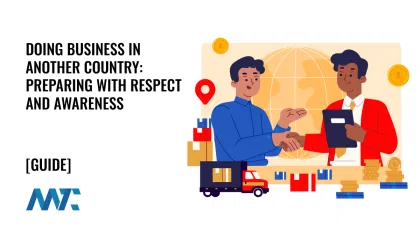
When I first began working in Paris, I learned two lessons almost immediately. The first was about attire. In the U.S. tech world, I was used to walking into meetings in jeans and a blazer. But in Paris, business attire meant suits—no exceptions. My casual look stood out the moment I walked through the door. While our clients may not have cared, I certainly did. I felt as though I had failed to meet the unspoken standard.
The second was about language. A colleague once told me that in Paris, if you don’t know French, you only really need to master two words: merci (thank you) and s’il vous plaît (please). Those two terms ensured you weren’t seen as arrogant for assuming everyone would speak your language. They were enough to soften interactions, open doors, and show gratitude.
These early lessons taught me something bigger. When doing business abroad, it’s not only what you sell or how smart your pitch is. It’s how you treat people. Payment may change hands, but respect is what makes partnerships last.
Do Your Homework on Local Customs
Every culture has unwritten rules. In some countries, punctuality is a non-negotiable expectation. In others, relationships take precedence over schedules. Customs surrounding hierarchy, gender roles, and negotiation style can significantly influence how a meeting unfolds.
Why it matters: Doing your research signals that you don’t expect the world to adapt to you, instead, you’ve taken time to adjust to them. Even a modest effort can save you from mistakes that would damage credibility. Every attempt I made to speak French while we were out resulted in a wonderful experience.
Master the Local Greeting Rituals
A greeting sets the tone before a single word about business is spoken. In France, it’s a firm handshake with steady eye contact. In Japan, it’s a bow, which communicates respect. The depth and length of the bow communicate respect: a slight bow (around 15°) is casual, a deeper bow (30–45°) is more formal, and very deep bows are reserved for apologies or showing profound respect.
In the Middle East, a handshake may last longer than you’re accustomed to, as it often conveys warmth. Breaking off too quickly may be perceived as impatience.
Why it matters: Greetings communicate respect in symbolic form. If you dismiss or mishandle them, you may appear careless. If you get them right, you’ve already earned goodwill before the meeting begins.
Dress as the Locals Do
My Paris experience taught me that attire is never trivial. In some cultures, dressing down is a sign of creativity. In others, it’s a signal that you’re not taking the meeting seriously. Clothing is silent communication, and people notice it before they notice your slides.
Why it matters: Matching local expectations eliminates distractions. Instead of focusing on how you look, your hosts can focus on what you say.
Learn Essential Courtesy Phrases
Even if you can’t speak fluently, mastering a few key phrases matters. Words like “please,” “thank you,” and “hello” carry outsized weight. They show you’re making an effort, however small, to step outside your comfort zone.
Why it matters: Assuming everyone speaks your language can come across as entitled. However, even two or three phrases in the local language can convey humility and respect.
Watch for Nuances in Communication Styles
Directness is prized in some cultures and avoided in others. Americans often view straightforwardness as a sign of honesty, while in East Asia, indirect phrasing is used to preserve harmony. A blunt critique in one country may feel efficient, while in another, it may cause lasting offense.
Why it matters: Misinterpreting communication styles can create unnecessary friction. Awareness allows you to listen between the lines and respond appropriately.
Respect Social Norms Beyond the Boardroom
Business often flows into meals, ceremonies, or personal interactions. In some places, rejecting a dinner invitation is a rejection of the relationship itself. In others, exchanging small gifts is a way to show respect.
Why it matters: These rituals are not distractions from business—they are business. Ignoring them can damage relationships, while embracing them shows you value partnership beyond the transaction.
Avoid Politics and Sensitive Topics
Conversations that feel like harmless debates at home may carry serious weight abroad. Political affiliations, government policies, or even sports rivalries can divide quickly. In some regions, speaking critically about the government could even put your hosts at risk.
Why it matters: Politics rarely builds trust in a professional setting, and more often than not, it builds walls. Keep discussions focused on business, industry trends, and shared goals. If politics arises, listen respectfully but refrain from offering strong opinions.
Balance Authenticity With Adaptation
Adapting to another culture doesn’t mean losing yourself. It means removing unnecessary barriers. When I traded jeans for a suit in Paris, I wasn’t pretending to be French. I was clearing the path so clients could focus on my ideas, not my attire.
Why it matters: Authenticity builds credibility, but so does respect. The sweet spot is being yourself while showing you care enough to meet others halfway.
Remember the Human Side
At its core, cross-cultural business is about relationships. Saying please and thank you is not about formality… it’s about acknowledgment. Too often in business, where money and contracts are the focus, we forget the simple power of gratitude.
Why it matters: Courtesy is a universal currency. It makes people feel valued, and valued people become partners, not just customers.
Takeaways: Preparing to Do Business Abroad
- Research customs: Prevents missteps and demonstrates humility.
- Learn greetings: Establishes trust before business begins.
- Match attire: Eliminates distraction and communicates respect.
- Use local courtesies: Small efforts show considerable goodwill.
- Adapt communication: Avoid misinterpretation and build clarity.
- Respect social rituals: Strengthens bonds beyond the transaction.
- Sidestep politics: Keeps the focus on shared objectives.
- Balance authenticity with adaptation: Be yourself while honoring their norms.
- Never forget please and thank you: Courtesy is timeless and universal.